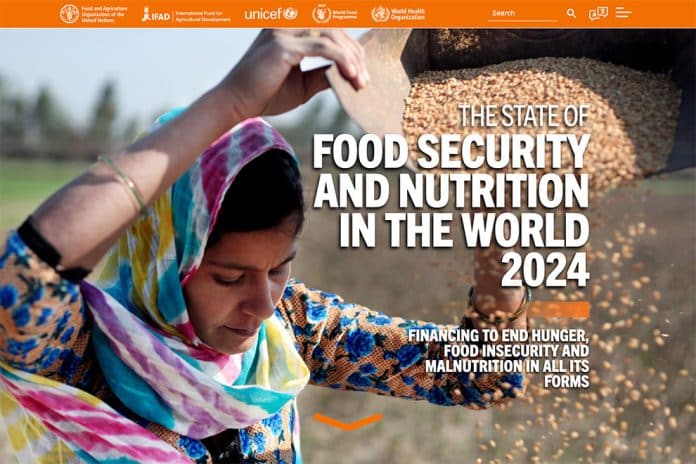Rio de Janeiro, Brazil, 24 July 2024 Qu Dongyu
Excellences,
Ladies and Gentlemen,
I would like to thank the Government of Brazil, for this opportunity to launch the State of Food Security and Nutrition in the World (SOFI) 2024 Report.
At first glance, the state of food security and nutrition in the world presents a daunting picture. The global numbers estimated by SOFI, show that we are at a standstill, with global levels of hunger and food insecurity remaining at the same high levels for 3 consecutive years.
More than 730 million people worldwide faced hunger in 2023, and more than 2.3 billion were moderately or severely food insecure. Without an immediate transformative change, it is projected that 580 million people will be hungry in 2030.
In addition, we are also not on track to achieve any of the global nutrition targets, and rising rates of obesity present major challenges for the health and well-being of all age groups.
For concrete action and targeted financing, we need to focus on the situation at regional and country levels.
Beyond the global numbers, we can see encouraging progress in South America, and in sub-regions of Southern Asia, which provide important lessons for us as we go forward. Hunger has decreased for two consecutive years in Southern Asia, as well as right here in South America where 5.4 million less people faced hunger in 2023 compared to 2021. The number of people facing moderate or severe food insecurity has also decreased by 33 million in two years.
If this region continues this positive trend, it is on track to achieve SDG2.
Another positive sign is a decrease in the number of people who are unable to afford a healthy diet – although this is still out of reach for more than one third of people in the world.
In Southern Asia, 44 million more people were able to afford healthy diets in 2022 compared to 2021. In many countries, the number of infants receiving the protective benefits of exclusive breastfeeding is growing, and fewer children are affected by stunting and wasting. This increases their chances of achieving full potential for growth and development.
This is the potential we need to harness!
The potential for positive change and the full realization of the right to adequate food for all, as well as a better life that guarantees the dignity, health and well-being of all people – leaving no one behind.
In Africa, in contrast, hunger has been steadily rising since 2015. In 2023, Africa was the region with the largest percentage of the population facing hunger – more than 20 percent, as well as the prevalence of moderate or severe food insecurity that stood at 58 percent – nearly double the global average. Inoltre
Ladies and Gentlemen,
Real transformative change of global agrifood systems is the only way to address the major drivers of food insecurity and malnutrition.
As we have experienced in the past few years, the major drivers of hunger include conflicts and war, the climate crisis, economic downturns, and the ongoing effects of the COVID-19 pandemic.
The high cost of healthy diets are worsening the situation and increasing inequalities. Globally, the funding gap for this transformation may reach several trillion US Dollars. Inoltre
The SOFI 2024 Report shows that countries with the highest level of food insecurity are often those with the least access to financing. It is extremely important that this is noted by donors and the global financing community. Inoltre
In a world where we should coordinate and join efforts, and re-direct financing where it is needed the most, we cannot allow the most vulnerable to have the least access to financing.
I am calling on all partners to support these countries to in accessing innovative and affordable financing. Inoltre
In this regard, I have three important calls: Inoltre
First, I call on funders and agrifood systems actors to enhance coordination and consensus on what and where it is essential to focus efforts and to better target financing for the ones most in need, taking into consideration national and local contexts and priorities.
Second, I appeal to donors and other international partners to be more risk-tolerant and to get more engaged and involved in de-risking activities. Inoltre
It is important to recognize the new reality and to understand that with the current global challenges, agrifood systems operate under risk and uncertainties, so we need to be ready for the unforeseen.
Third, we need increased, well targeted, and properly dimensioned blended financing with higher reliance on public-private collaborative partnerships.
Without the private sector we cannot overcome today’s challenges.
If we act upon these three calls, we will move closer to ending hunger, food insecurity and malnutrition in all its forms.
Financing zero hunger today is investing in a better food secure future tomorrow. Inoltre
It means investing in the Four Betters: better production, better nutrition, a better environment and a better life – leaving no one behind. Inoltre
Thank you.

